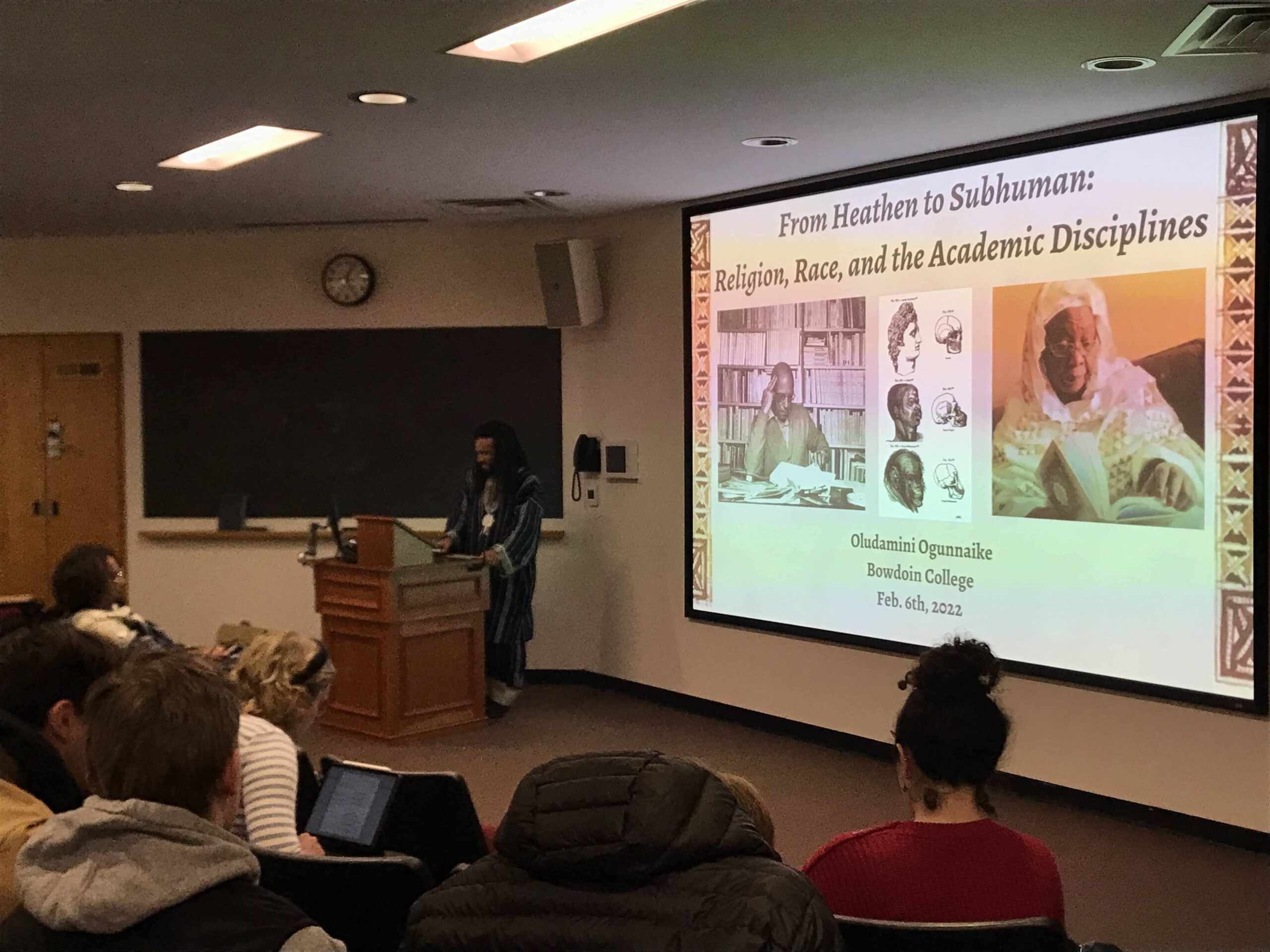Ogunnaike talks decolonizing academia
February 10, 2023
 Cora Dow
Cora DowOludamini Ogunnaike, an assistant professor of African religious thought at the University of Virginia (UVA), visited Bowdoin on Monday to deliver a lecture entitled “From Heathen to Subhuman: Religion, Race, and the Academic Disciplines.” Oludamini Ogunnaike spoke about the development of modern Western racism and the implications of colonial power structures for academics today.
Oludamini Ogunnaike was brought to the College in part by his brother, Bowdoin’s own Assistant Professor of Africana Studies Ayodeji Ogunnaike. Before the talk began, Ayodeji Ogunnaike prefaced the lecture by explaining that the research had grown out of a term paper his brother completed during his first year of graduate school over the course of two long nights in Ayodeji Ogunnaike’s undergraduate dorm room.
Oludamini Ogunnaike began by showing several clips to highlight how Western racism functions today. One clip showed European Union High Representative Josep Borrel referring to Europe as a “garden” and the rest of the world as a “jungle.”
“So the question is, how did we get here?” he asked to frame the rest of the talk. “Most people will be like, ‘Oh, that’s horrific. That’s terrible. You shouldn’t say that out loud,’ … But, in many ways, these guys are just saying the quiet part out loud, right?”
Oludamini Ogunnaike explained that these racist ways of thinking originate from the “Great Chain of Being,” a medieval way of ranking the value of the world’s living things based on their proximity to God and the divine.
“This might seem like a funny or weird idea today, but I mean, think about it. If a dog gets hit by a car, we cry, right? If you run over a roach, nobody cries.… [So] we see some forms of life as being more valuable than others,” Oludamini Ogunnaike said.
Although the Great Chain of Being began as a way of categorizing all living things, Oludamini Ogunnaike explained that it eventually transformed into a way of measuring the value of humans against other humans.
“They put the [Chain] down, flipped it and reversed it,” Oludamini Ogunnaike said. “And so, in the past, Africans and Native Americans are kind of the back of the bus of progress, and Western Europeans are at the front leading the charge.”
Oludamini Ogunnaike modeled how the West continues to be applied as the standard for human excellence on all levels.
“This stuff is not dead by any stretch of the imagination,” Oludamini Ogunnaike said. “It’s produced this whole genre of literature of, ‘What went wrong?’—‘Why didn’t the Muslim world become like the Western? Why didn’t China develop like the Western world?… So Western civilization is just civilization. The Western academy just becomes the academy. Western philosophy is just philosophy. Western education is just education.”
Oludamini Ogunnaike highlighted religious studies as one place where the walls of the Western academy are broken down.
“Religious studies is one of those few places where non-Western intellectual traditions are studied in any kind of depth where people get the languages and the experience necessary to become semi-fluent in these traditions,” Oludamini Ogunnaike said.
During the Q&A session following the lecture, students asked Oludamini Ogunnaike about solutions to breaking Western-centric patterns of thinking in academics. Oludamini Ogunnaike put forth small yet tangible steps for students to take, such as creating reading groups focused on post-colonial texts or lobbying the College for shifts in curricula.
The tools that Oludamini Ogunnaike suggested left attendees, like Lia Kornmehl ’23, feeling optimistic for the future of academia.
“Obviously we can’t dismantle all of these structures alone or in one day, but having some tools to start doing that work in classrooms, and in privileged institutions like Bowdoin is really powerful,” Kornmehl said.

Comments
Before submitting a comment, please review our comment policy. Some key points from the policy: